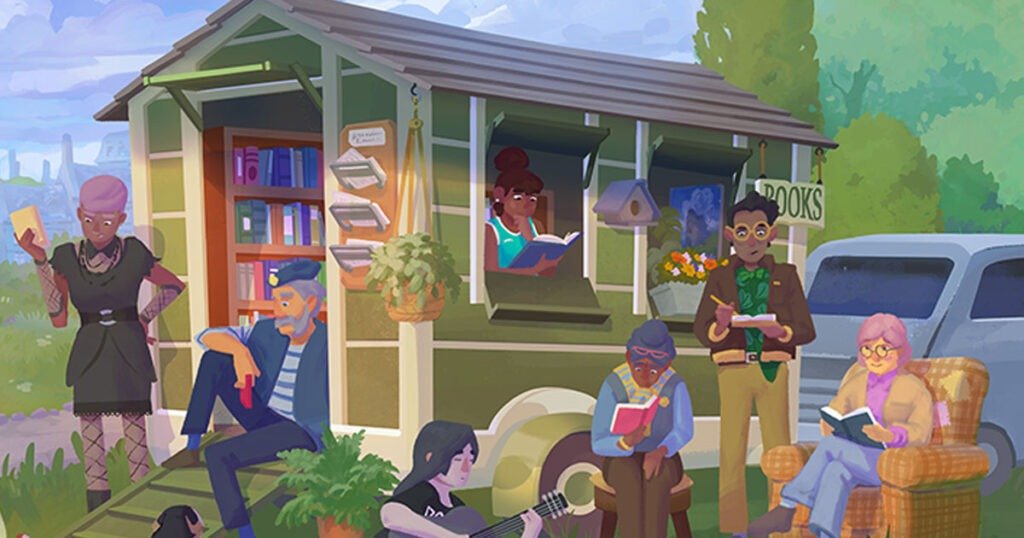Table of Contents
Tiny Bookshop on PC
Few management sims successfully balance whimsy with realism, let alone capture the true essence of their real-life inspirations. Tiny Bookshop from Neoludic Games and Skystone Games is among the small percentage of cosy titles that both feel like an escape into a different world and evoke the passion of recommending the perfect book, something booksellers strive for and excel at.
For a game that seems simple on surface level — you’re a mobile bookshop owner who just moved to a new, seaside town hoping for a fresh start — there’s a lot to unpack across hours of gameplay in this super addictive narrative sim.
Whimsical Realism in Tiny Bookshop
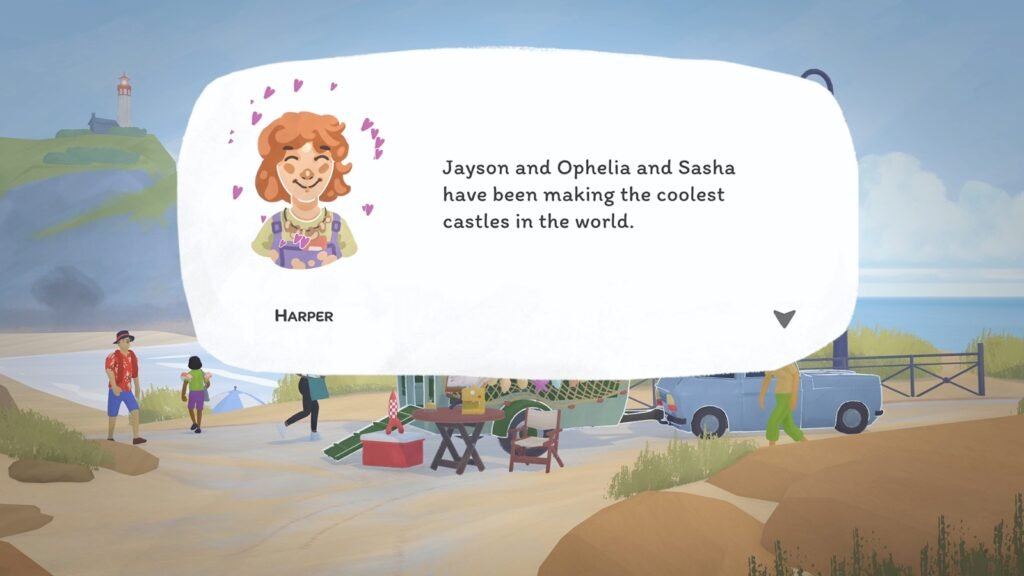
Bookstonbury is a sleepy seaside town that takes deep pride in the work of its forefather, St. Bookston. Upon moving there, Tiny Bookshop players will be introduced to a cast of NPCs with differing tastes in books and decor, all of whom have advice about how to be successful in business. Each of them also offers a unique storyline to pursue, unlocking new locations, events, and plot points as the seasons progress.
Like its cosy peers, Tiny Bookshop takes place across four seasons with 28 days per season. Some locations close during certain times of year, and weather will impact events, customer traffic, and item effects.
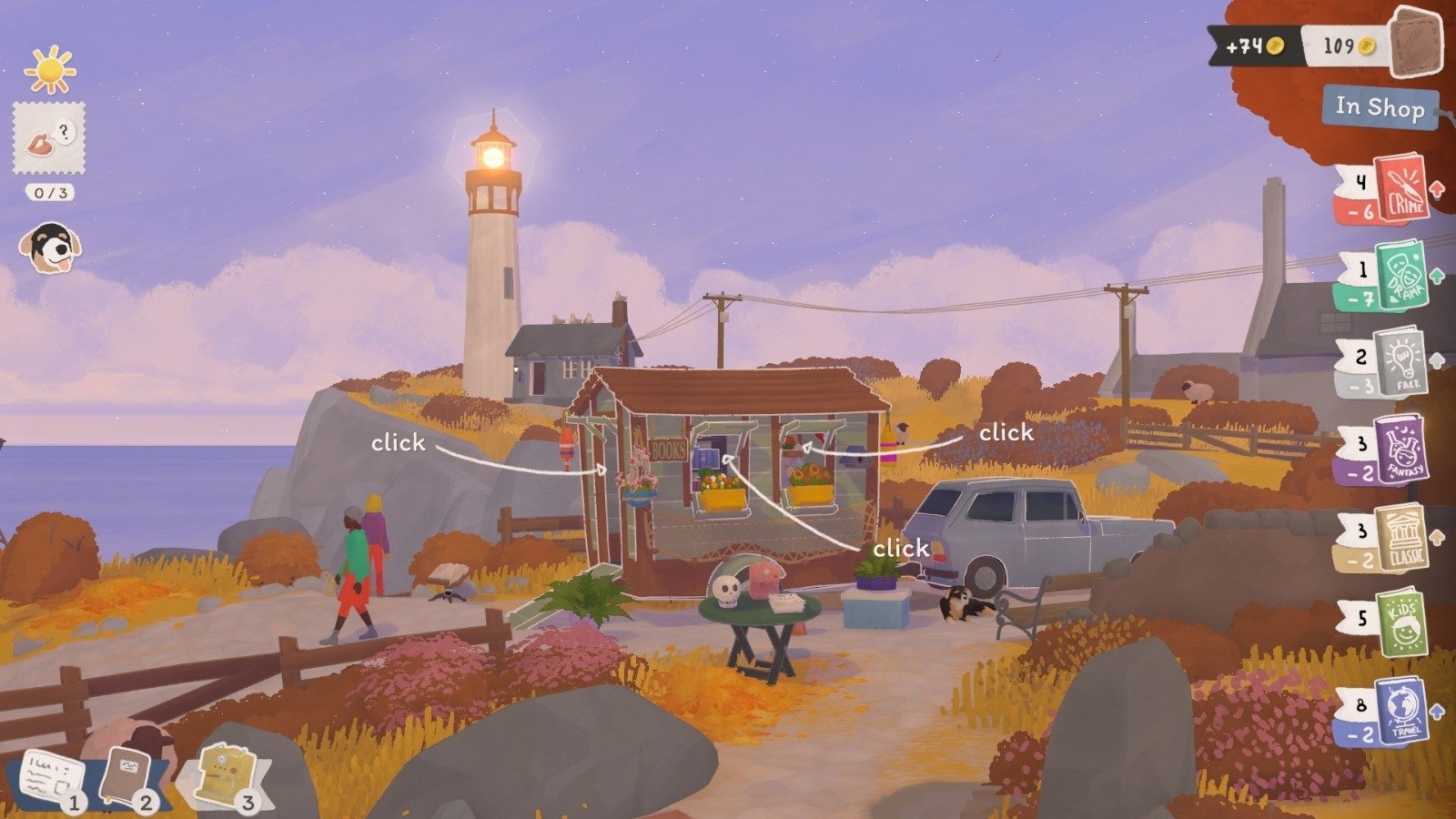
The more you explore, the more fun the game becomes. In addition to decking out your bookshop in all manner of decor, from creepy-crawly cobwebs and jack-o-lanterns in autumn to brightly-lit trees and garlands in winter, you can adopt animals (and yes, you can pet them), solve decades-old town mysteries, and help your new friends achieve their dreams.
Every interaction — including looking at the daily Bookstonbury Review newspaper — is an opportunity to learn new lore or unlock a new story element. Along the way, you become intimately acquainted with your craft as a bookseller, which in this case means learning every inch of your stock.
In addition to named NPCs, there are also customer archetypes, including kids, tourists, and goths. As NPCs and other customers browse the shelves, they may ask for recommendations. Using the hints the customer gives you, you must suggest just the perfect title. Seven genres exist in Tiny Bookshop: crime/horror, sci-fi/fantasy, classics, drama, travel, fact, and kids/young adult. Of course, some titles have crossover appeal, so someone looking for a young adult romance might be just as likely to find what they need in the drama section as in the classics section—that’s where you come in.
Some titles in Tiny Bookshop are fictional and exist only in-universe. But the majority of the books that stock your shelves are real. Aubrey Gordon’s What We Don’t Talk About When We Talk About Fat sits in the fact section, while N.D. Stevenson’s seminal graphic novel Nimona is shelved with kids/young adult. There are plenty of titles by Octavia Butler, Shirley Jackson, Jane Austen, William Shakespeare, and Stephen King. Clicking through each book is a genuine delight, especially if you’re an avid reader. My to-be-read pile increased significantly while playing this game.
Neoludic’s layering of fictional and real-world elements makes Tiny Bookshop feel perfectly grounded, enhancing the story by calling upon the player’s actual knowledge. This makes the bookseller’s storyline feel that much more immersive: you move to Bookstonbury with a particular skillset and a passion for books, and the more time you spend there, the more you care about giving each customer exactly what they need.
Tiny Bookshop Flows At Your Pace
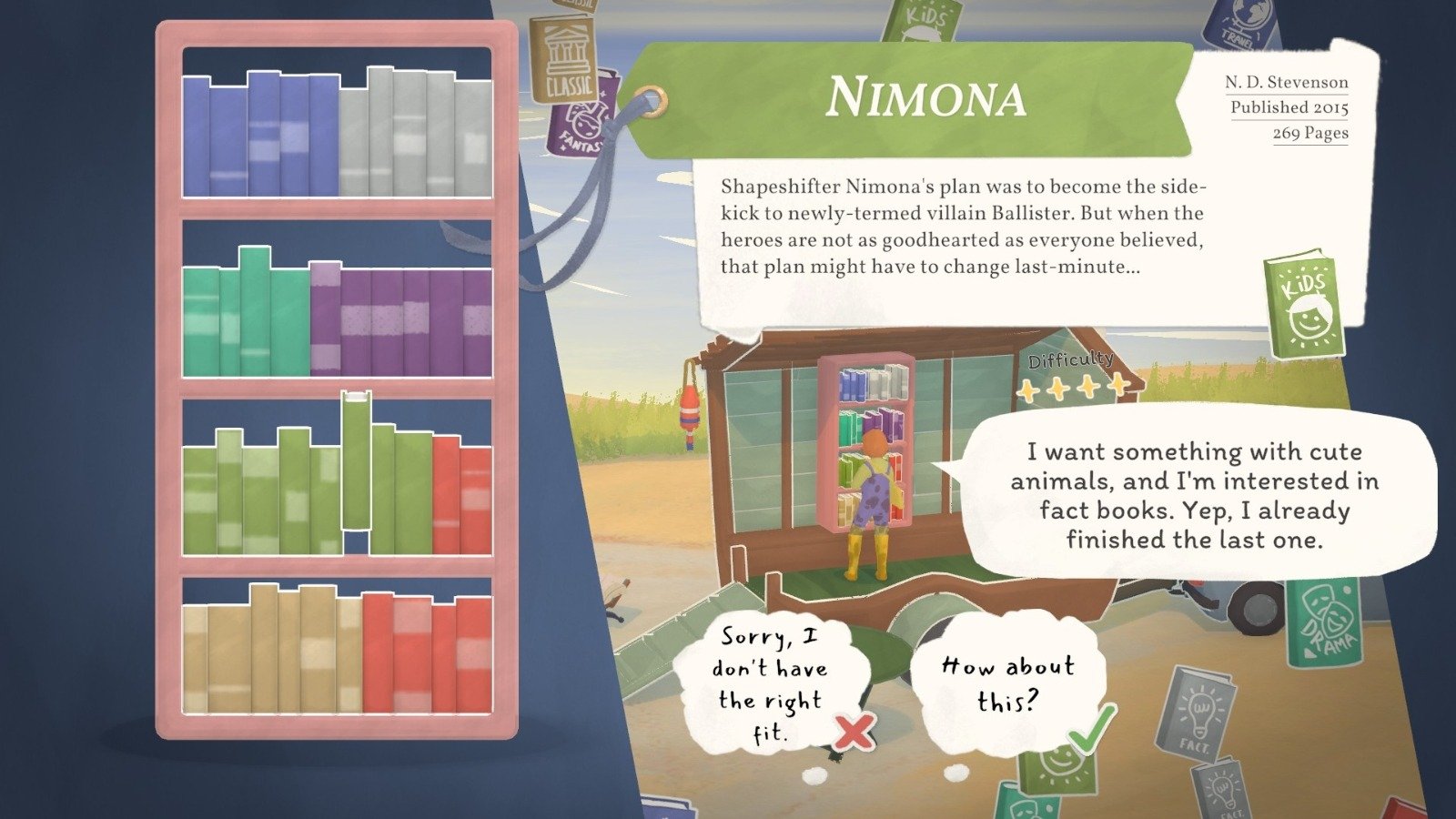
Every storyline overlaps to some degree in Tiny Bookshop, but it’s up to you how fast you want to move through each person’s requests or how often you want to visit each location. There are pros and cons to each map spot depending on the season and even the day of the week. Aside from a few events you have to attend on their specified days (like end-of-season celebrations and some core memories), Bookstonbury is yours to explore as you please.
Ultimately, this means you are in charge of how fast the story moves. There are minimal cut scenes, and they won’t rip you away from the action. However you choose to prioritise each quest, you will always have time to pursue plot points later. This may mean having to complete specific tasks the following year if you run out of time, but that’s okay! There’s no rush.
As time progresses, characters will go through life changes and talk about them with you at the bookshop. Some of these are plot-specific, while others are flavour text that simply reflect how much time you’ve spent in-game. It’s a lovely touch that puts Tiny Bookshop a step above many of its peers. Having the same conversations with NPCs gets tiresome, and there’s little risk of that here.
Recommendation requests can feel repetitive at times, but with numerous books and potential solutions to each, this approach also feels low-risk, given two full years of in-game time (224 days), averaging between 3-10 recommendations per day. The full story’s conclusion is also worth every second of gameplay. Getting to know each character feels truly magical, and the apparent intention behind the narrative makes it that much more impactful.
Open to All
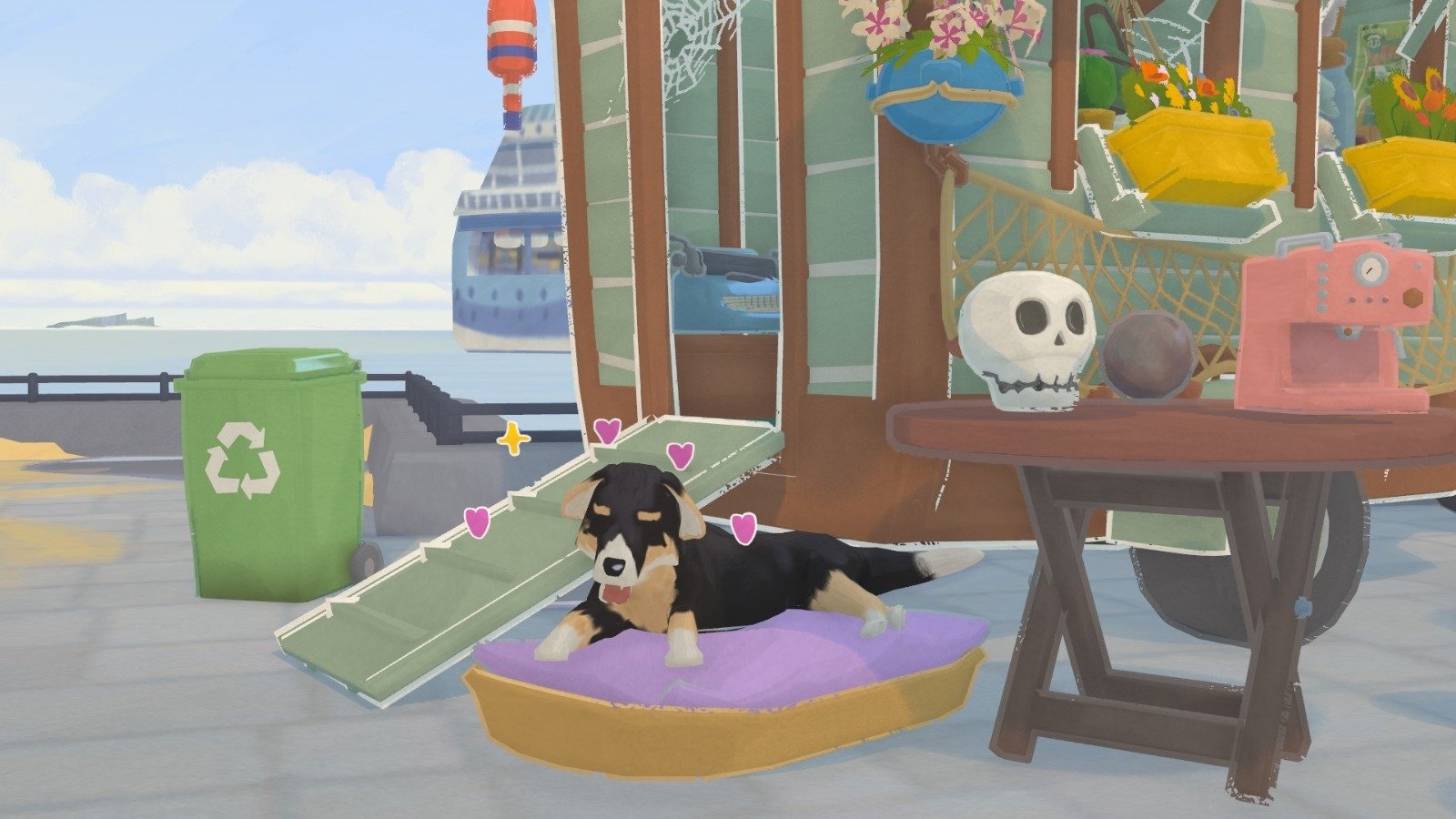
Tiny Bookshop is a highly visual game. While there are audio cues for important moments like recommendation requests, none of the characters are voiced, and the accessibility settings do not offer a voiceover option. Some games can be modified for screen reader usage for blind or low vision players, but it’s unclear whether this particular title will have that compatibility.
Accessibility features included in Tiny Bookshop include a toggle to tap or hold buttons if you’re playing with a controller, a slider to increase or decrease the duration of recommendation bubble pop-ups, a toggle to auto-accept recommendations, a toggle to pause the game when tooltips pop up, and a toggle to reduce visual effects. Players can also change the colours of each book type, including vibrancy and saturation, to suit their needs (and aesthetics).
Standard features like cursor and camera speed, camera control type, and vibration strength can also be adjusted to the player’s specifications. For purposes of this review, I played with a mouse and keyboard and found the experience engaging, but relaxing. Timed events didn’t cause undue stress, and the audio cues were helpful, especially when I was exploring an area and not watching customers shop.
As a sim, what Tiny Bookshop is able to accomplish is truly impressive. It hooks you like an intriguing mystery, makes you fall head over heels with the premise and characters like a romance novel, and delivers a satisfying ending akin to an epic saga. It is truly made for players and readers of all ages, and just needs a little more accessibility magic for a complete tale.
Tiny Bookshop launches on PC via Steam on August 7.
SavePoint Score
Summary
Tiny Bookshop is a truly delightful management sim that perfectly balances a well-written, often whimsical narrative with real-world elements that help it stay grounded. For blind or low vision players, an audio component or mod compatibility for screen readers or similar would be huge.

